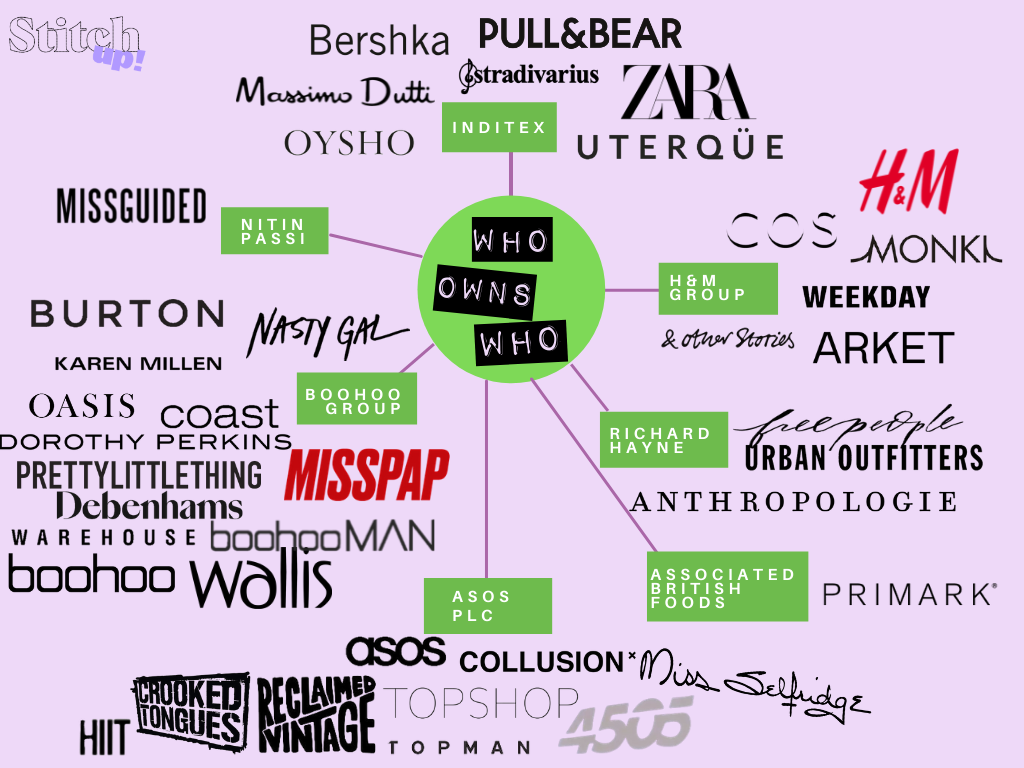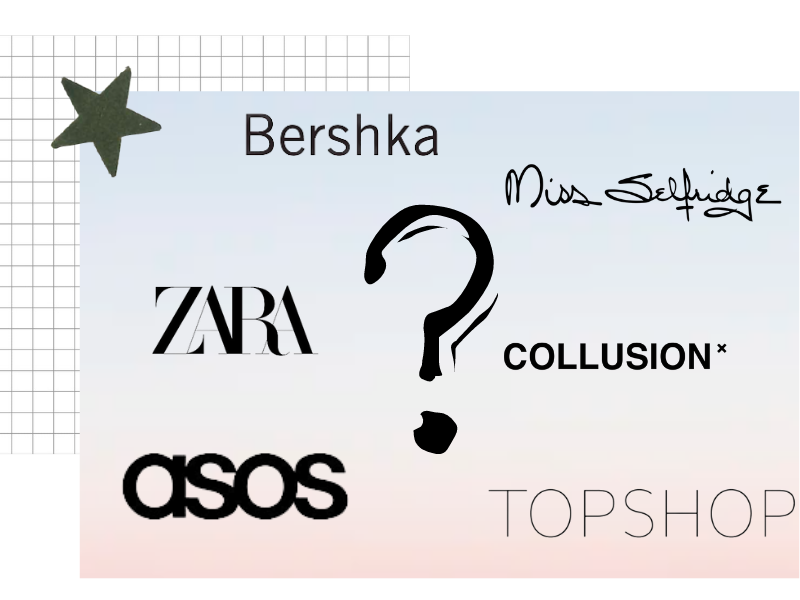Despite hundreds of seemingly distinct brands on our high streets, many clothing shops are actually owned by the same companies. While some brands have sustainable ranges and environmental promises, others under the same parent organisation are facing scandals about working conditions. Karen Millen’s new ‘ready for the future’ campaign, with recycled packaging? Owned by the same people who founded Boohoo – one of the worst offenders for fast fashion waste.
So who really owns who?

Spain-based Inditex is the biggest global clothing retailer, with over 7,200 stores worldwide. Their main brand is Zara, but they also own Bershka, Pull & Bear, Stradivarius, Massimo Dutti, Oysho and Uterqüe.
Instead of focusing on making clothes for the next fashion season, Inditex uses customer buying patterns and an efficient production process to restock stores with new and different products every week. In Zara, for example, a new piece of clothing can be on the shop floor within 15 days of designing it. Forget fast fashion, this is rapid fashion.
H&M Group is the second-largest global clothing retailer and was founded in 1947 by Erling Persson. Its first brand was H&M, a fast fashion behemoth that has been implicated in workers’ rights and sustainability scandals for years. It sells an eye-popping 3 billion items of clothing every year.
Its wide range of clothing brands have varying attitudes to sustainability – which makes it all the more surprising that they are owned by the same company. Under the same roof is ‘eco-conscious’ brand Monki, founded in 2006, which boasts “sustainability is at the core of everything we do.”
Another youth-focused brand, Weekday, was founded in 2002 and says 83% of its materials are sustainable. In 2007, H&M launched COS, known for its minimalist style and non-trend-based pieces. They also own & Other Stories, which opened in 2013, and ARKET, which began in 2017 – all aimed at a more mature, sustainability-conscious consumer.
Richard Hayne co-founded bohemian brand Free People in the early 1970s with his former wife. He also owns trendy ‘lifestyle’ brands Urban Outfitters and Anthropologie as part of the URBN group. Each of these brands is rated ‘not good enough’ by sustainability ratings site, Good On You.
Boohoo Group owns a huge number of brands and made revenues of £1.74bn last year. They launched BoohooMAN in the spring of 2016, and acquired PrettyLittleThing later that year. They bought Nasty Gal in 2017, which offers “vintage-inspired” fast fashion, and picked up Misspap in March 2019. In August of the same year, Boohoo bought Karen Millen and Coast, and in 2020 it took on Oasis and Warehouse. In January 2021, the group acquired Debenhams and in February, bought Burton, Wallis and Dorothy Perkins.
Should we care? Boohoo has been blamed for pushing down quality and labour rights standards, with Good on You writing: “Boohoo is another typical example of the newest kind of fast fashion brands, designing and putting clothes on the market even faster than before, sometimes in just under a week. By doing this, Boohoo encourages a ‘throw-away’ culture and makes us believe we need to shop more and more to stay on top of trends, creating a constant sense of need and ultimate dissatisfaction. No thank you, NEXT!”
ASOS Plc has been steadily snapping up the competition over the last decade. From its beginnings in 2000 selling knockoffs of clothing from film and TV – hence ‘As Seen On Screen’ – it’s rapidly grown to become one of the UK’s leading online-only brands, boasting sales of £3.2bn in 2020. Famously, it bought failing high street brands Topshop, Topman, Miss Selfridge and HIIT from Arcadia Group this year. These brands join a roster of companies, including ASOS’ own label, Crooked Tongues, 4505, Reclaimed Vintage, Collusion and As You.
H&M Group said: “Thanks for your email. Our brands and businesses offer a variety of products and services empowering customers to explore their individual style and embrace more sustainable habits. Our sustainability vision applies to all our brands, while allowing each to maintain a unique identity and develop its own approach to delivering our group strategy. We all are aligned in our shared mission to make fashion more sustainable. More information around our sustainability work is to be found in our Sustainability report 2020 on hmgroup.com: https://hmgroup.com/sustainability/sustainability-reporting/.”
ASOS Plc said: “Our sustainability strategy, Fashion With Integrity, applies to all the brands owned by ASOS to make sure that we’re consistent. Where we have newly acquired brands we work to ensure they align with our Fashion with Integrity programme as soon as possible. For example, you can find a statement on the work we’re doing on the Topshop supply chain here.”
Boohoo Group, Richard Hayne and Inditex did not reply to a request for comment.

